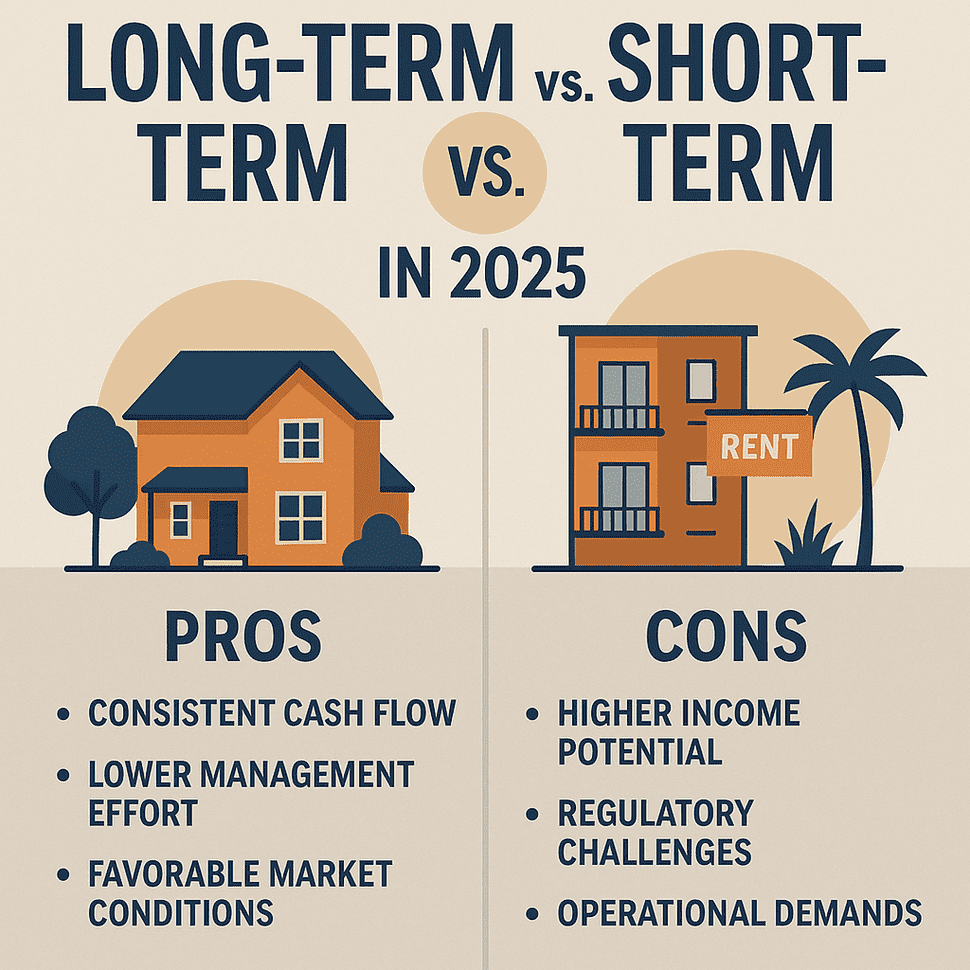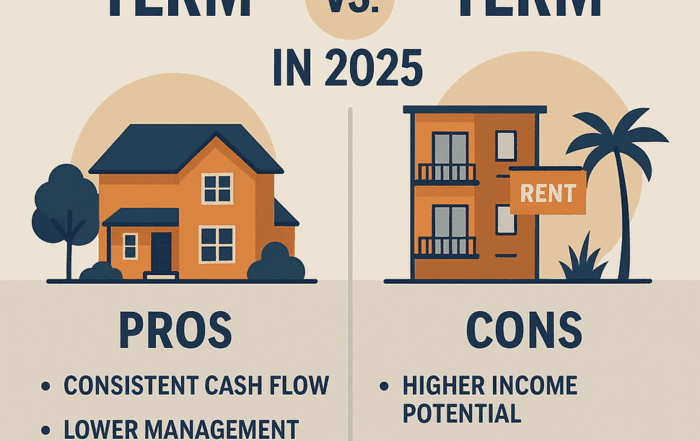
In 2025, the real estate world feels a little like a game show. Behind door one: long-term rentals—steady, reliable, and mostly drama-free. Behind door two: short-term rentals—flashier, possibly more rewarding, but full of surprises. So, which one should you choose?
As someone who’s owned 38 long-term rentals and 2 Airbnbs over the past 20 years, I’ve seen both the calm and the chaos. Let me break it down in simple terms, like we’re just having coffee and chatting about how to make that $50K work smarter.
The Basics: What’s the Difference?
A long-term rental is like dating someone steady. You sign a lease, you see them once a month (for rent), and they only call if something breaks.
A short-term rental? That’s like speed dating. Constant messages, constant cleaning, and a whole lot more excitement—but it can burn you out if you’re not prepared.
Long-Term Rentals: The Tortoise in the Race
Pros:
-
Predictable Income: You know what you’re getting each month. If your tenant’s solid, the cash flow is steady and boring (in a good way).
-
Lower Turnover Costs: Instead of cleaning and staging every week, you’re painting and repairing once a year, maybe.
-
Easier to Finance: Banks love long-term leases. It shows stability and predictability.
-
Less Management: Once the lease is signed, it’s basically set-it-and-forget-it. Maybe one or two calls a year.
-
Good Tenants Stay: People who treat the home like their own often stay for years, especially if you keep rent fair and take care of maintenance.
Cons:
-
Slow Equity Buildup: You’re not cashing out big every month. It’s a long game of wealth-building.
-
Tenant Risks: A bad tenant can cause damage or stop paying. You need reserves and maybe legal help.
-
Rent Control and Regulations: In some cities, rent hikes are limited and evictions are tough.
-
Limited Use: You can’t use the property for yourself, like you might with a vacation home.
Short-Term Rentals: The Hare With Potential
Pros:
-
Higher Potential Income: You can charge more per night, especially in touristy or high-demand areas.
-
Flexibility: You can block out time for personal use or maintenance.
-
Furnished Property Depreciation: Furnishings and expenses may provide faster write-offs.
-
More Control Over Pricing: You can adjust rates based on seasons or events.
-
Creative Spaces Win: Cool decor, themed houses, or Instagram-worthy interiors can drive up bookings.
Cons:
-
More Work: Cleanings between guests, bookings, messages, managing reviews—it’s a full-time job or you’re paying someone else.
-
Higher Expenses: Utilities, cleaning fees, linens, repairs from frequent use—they add up.
-
Regulations Are Changing Fast: Many cities are tightening restrictions or banning STRs entirely.
-
Occupancy Risk: Bad weather, slow seasons, or negative reviews can sink your occupancy rate.
-
Property Management Takes a Cut: STR managers charge more (20-30%), and even then, you still have to be involved.
What’s Happening Right Now (2025 Edition)
The short-term rental space is flooded in many markets. Everyone with a Wi-Fi connection and a Pinterest board has listed a property. That means more competition, lower occupancy rates, and more pressure to stand out.
Meanwhile, long-term rentals are quietly having a moment. As interest rates stay high, fewer people can afford to buy homes. That pushes more people into the rental market, and demand for quality long-term housing goes up.
I’ve personally seen some of the best deals in the long-term space lately. Properties that used to sell for insane prices are finally coming back down to earth. And guess what? Rents are still solid. That’s a good spread for buy-and-hold investors.
The Time Factor
Want to travel and not be glued to your phone answering “Where’s the Wi-Fi password?” Stick with long-term. Want to hustle, optimize listings, and build a mini-hotel business? STR might be your thing.
When I started, I thought I wanted excitement. And for a while, Airbnbs were fun. But long-term rentals paid the bills, built equity, and let me sleep at night.
Lifestyle Fit: Know Thyself
Let’s say you have young kids, a 9-to-5 job, and no time to chase cleaners or manage guests. Go long-term.
Now if you’re tech-savvy, have flexible time, and love optimizing systems, a short-term rental might become your passion project. Just be ready to treat it like a business.
Risk vs. Reward
Short-term rentals can produce more income. But they also come with more unpredictability. One bad review or a change in local law, and your “passive” income disappears.
Long-term rentals are less sexy but much more predictable. And in 2025, predictability is golden.
My Real-Life Take
Out of my 40 properties, only 2 are Airbnbs. Why? Because the other 38 run on autopilot. I get steady cash flow, and my team handles the occasional hiccup.
With the Airbnbs, I need to check systems constantly. I need backups for cleaners, rapid responses to guests, and to keep the place furnished and photo-ready. It’s fun, but it ain’t passive.
Also, Airbnbs used to book themselves. Now, you better have killer photos, great reviews, and competitive pricing or you’re sitting vacant. That’s more work, more money left on the table if you mess up.
What’s Best for 2025?
If I had to start over today with $50K? I’d be scooping up long-term rental properties in markets like Tampa. I’m seeing deals that cash flow day one, and with rates eventually set to drop, you get that refinance bonus later.
I’m not saying never do short-term. I’m just saying build your base first. Let long-term rentals build your equity and stability. Then if you want to dabble in STRs later, do it from a place of strength, not desperation.
Final Thoughts
There’s no one-size-fits-all answer. But here’s a simple way to think about it:
-
Want steady money and freedom? Long-term.
-
Want higher income and a side hustle? Short-term.
The real secret? Know your goals. Know your tolerance for stress. And don’t believe every Instagram reel showing someone making $20K/month from a beach condo. Ask them how much went to cleaners, furniture, property managers, taxes, and slow seasons. The math doesn’t always math.
Long-term rentals helped me build a foundation. They bought me time, peace of mind, and freedom. The Airbnbs? They added some extra spice.
Start with the steak. Then add the sizzle later.
Keep it consistent, stay patient, stay true—if I did it, so can you. This is Jorge Vazquez, CEO of Graystone Investment Group and all our amazing companies, and Coach at Property Profit Academy. Thanks for tuning in—until the next article, take care and keep building!
Pick your expert. Book your free 15-minute consult now. We are here to help!
Our Top Articles
Long-Term vs. Short-Term Rentals in 2025: Which Strategy Wins?
In 2025, the real estate world feels a little like a game show. Behind door one: long-term rentals—steady, reliable, [...]
What Does Cap Rate Mean in Real Estate (And Why I Actually Use It)
What Does Cap Rate Mean in Real Estate (And Why I Actually Use It) Alright, I’m gonna break this [...]
Real Estate Investment Analysis: How to Know If a Deal Is Actually Worth It
Real Estate Investment Analysis: How to Know If a Deal Is Actually Worth It You know how some people [...]
Property Profit Academy:
✔ Learn to buy properties with little to no money down.
✔ Build a $10M portfolio step by step.
✔ Master strategies like BRRRR and house hacking.







